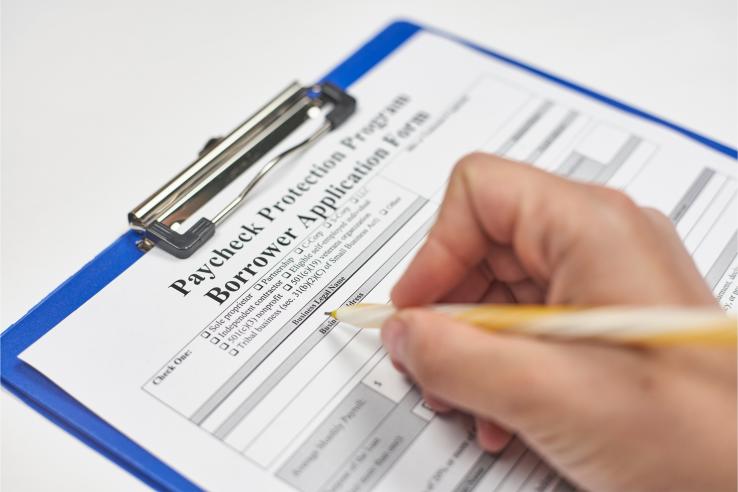
Too complicated, too confusing: why more small businesses aren’t applying for coronavirus relief loans, and what we can do to reach them

Economic recovery in the wake of COVID-19 will depend on the survival of businesses, yet many at-risk small businesses struggle to reach the SBA’s financial lifeboat.
Small businesses in the United States have taken a catastrophic hit since March, when precautions to prevent the spread of the virus forced many to close their doors or drastically reduce their activity.
Congress has responded to the economic crisis with a package of temporary loan programs to help small businesses weather the storm. Administered by the Small Business Administration (SBA), the Paycheck Protection Program (PPP) and the Economic Injury Disaster Loan (EIDL) make rapid, forgivable loans available to businesses with under 500 employees.
As of May 23, the SBA had approved nearly 4.5 million PPP loans. While this number is staggering, it also reveals that millions of small businesses are not yet accessing these lifeline loans. Many may be failing to apply because of difficulties filling out the complicated forms, confusion about program rules, or uncertainty regarding eligibility.
A survey found that more than 13 percent of small business owners did not expect to take out a PPP loan, citing the hassle of applying, distrust that the federal government will forgive the loans, or confusion around eligibility. Another survey by the NFIB finds that nearly three-fourths of small business borrowers find the terms and conditions of the PPP loan difficult to understand, with 22 percent finding them very difficult.
Women- and minority-owned small businesses have been disproportionately impacted by the crisis, and have struggled the most to access SBA loans. For business owners that are not fluent in English or have little familiarity with navigating American bureaucracy, the complexity of applying for federal loans is even greater.
Resolving the rampant confusion around the SBA emergency loans should be a top concern for policymakers. Helping the smallest businesses and those that employ low-income and marginalized workers would be particularly beneficial to the economy, as these are the workers who are most likely to spend their paycheck immediately and help jump start the economy.
How might policymakers encourage applications from the most vulnerable small businesses?
While the evidence base around what works to support to small businesses is still limited, research around overcoming informational barriers—the lack of awareness and confusion around application procedures and eligibility requirements—to taking up a social protection program may provide valuable insights into improving similar programs designed for small business owners. These studies may have limited generalizability to a pandemic setting, but nevertheless can be informative for policymakers developing strategies to help small businesses overcome these barriers.
Offering professional help can increase the successful completion of applications.
Several randomized evaluations show that providing personal assistance to applicants can increase application submissions and improve program take-up. One evaluation, for example, finds that providing students with application assistance raised Free Application for Federal Student Aid (FAFSA) submissions by 40 percent. Another randomized evaluation similarly finds that providing informational mailings and application assistance tripled Supplemental Nutrition Assistance Program (SNAP) enrollment. For agencies that are short-staffed, governments can consider partnering with local entrepreneur support organizations that offer professional guidance to applicants.
Active outreach to eligible businesses may motivate more applications.
This is particularly important for reaching minority-owned businesses, and directly addresses the obstacle of lack of awareness of available programs. One randomized evaluation finds that directly providing consumers with information on health insurance plans, rather than relying on consumers finding it themselves, led to increased plan switching and savings for consumers. Evidence from an evaluation of an effort to increase Earned Income Tax Credit (EITC) take-up shows that sending repeated notifications with simple, highly relevant information improved taxpayers’ likelihood of claiming the benefit.
Clearing up confusion around terms and conditions may also change business owners’ minds about the programs. Researchers found that providing businesses in South Africa with free access to a labor law information service for employers decreased the perception that labor laws were an obstacle to hiring and subsequently increased hiring.
Simplifying program information and applications may increase responsiveness.
In the same EITC study, researchers simplified the eligibility worksheet and compared the response rate to that of the more complex worksheet. The complex worksheet generated a 17 percent lower response rate, suggesting that the complex materials may have dampened response by reducing the degree to which individuals paid attention to and understood program information. Simplifying the PPP and EIDL applications so that business owners have a higher likelihood of successfully completing it on their own may both boost the quantity of applications and the number that are accepted.
Applying for social protections and federal relief loans can be complicated to the degree of excluding those who need them most. In order to support small businesses struggling the most, policymakers must take specific actions to be more inclusive of low-income and minority-owned businesses when rolling out relief programs.
Even as restrictions begin to lift and businesses open their doors once more, social distancing measures and consumer wariness could mean that demand may not pick up again for a while to come. Designing effective outreach strategies and continuing to support small businesses during the recovery will be crucial for a while to come.


